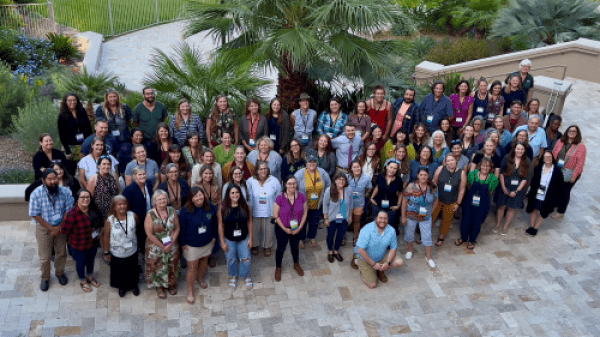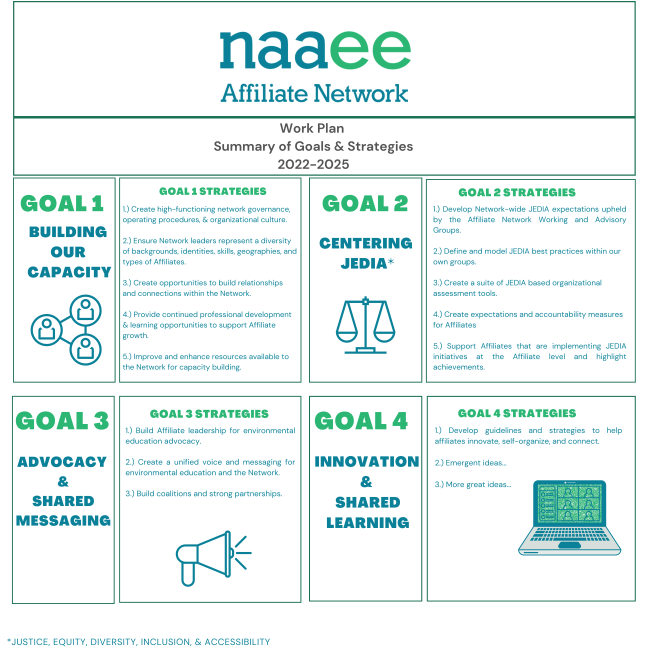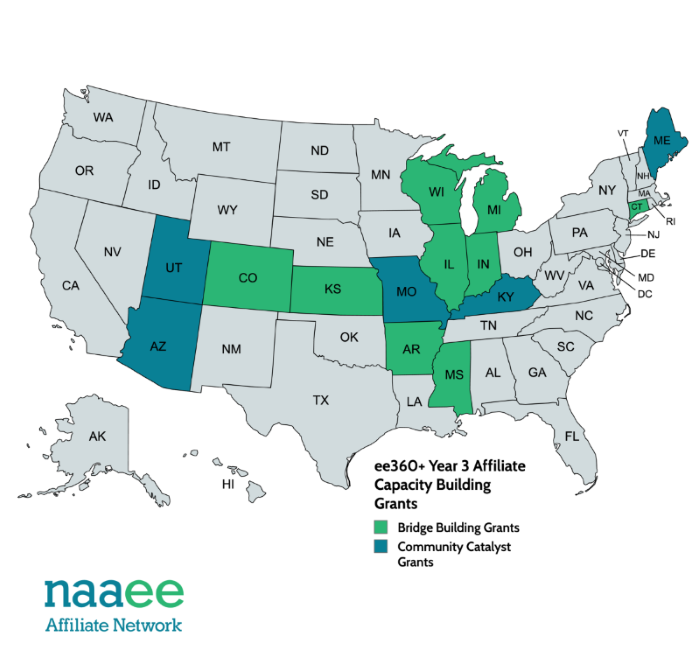Building Bridges (and Capacity) Through ee360+ Affiliate Grants

Written by Bruce Young, Affiliate Relations Specialist, NAAEE
A Strong and Healthy Network
The members of the NAAEE Affiliate Network make up an extensive circuitry of programs, initiatives, and supports to energize the field. A strong and healthy network ensures that ideas, learnings, and successes can flow easily across the network, powering ongoing innovation. As a member of the NAAEE staff focused on nurturing and supporting the network in all of their many initiatives, we are always looking for creative ways to support Affiliates doing good work in their communities.
NAAEE Affiliate Network Work Plan Summary of Goals and Strategies 2022–2025
The infographic has been transcribed into plain text below:
- Goal 1: Building Our Capacity
- Create high-functioning network governance, operating procedures, and organizational culture
- Ensure Network leaders represent a diversity of backgrounds, identities, skills, geographies, and types of Affiliates
- Create opportunities to build relationships and connections within the Network
- Provide continued professional development and learning opportunities to support Affiliate growth
- Improve and enhance resources available to the Network for capacity building
- Goal 2: Centering Justice, Equity, Diversity, Inclusion, and Accessibility
- Develop Network-wide JEDIA expectations upheld by the Affiliate Network Working and Advisory Groups
- Define and model JEDIA best practices within our won groups
- Create a suite of JEDIA based organizational assessment tools
- Create expectations and accountability measures for Affiliates
- Support Affiliates that are implementing JEDIA initiatives at the Affiliate level and highlight achievements
- Goal 3: Advocacy and Shared Messaging
- Build Affiliate leadership for environmental education advocacy
- Create a unified voice and messaging for environmental education and the Network
- Build coalitions and strong partnerships
- Goal 4: Innovation and Shared Learning
- Develop guidelines and strategies to help Affiliates innovate, self-organize, and connect
- Emergent ideas

An infographic breakdown of the 4 Affiliate Network Work Plan Goals
Keeping our network goals in mind—specifically, those of building capacity for environmental education at the local level and centering JEDIA (Justice, Equity, Diversity, Inclusion, and Accessibility) in the field—and with ee360+ funding, we focused our latest round of Affiliate capacity-building grants on two tiers of funding: Bridge Building grants and Community Catalyst grants.
Bridge Building grants were designed with new partnerships in mind, focused on convening environmental education partners working in one or more vulnerable communities (as identified using the EPA’s EJScreen tool) to identify barriers, gaps, and needs related to expanding equitable access to environmental education and creating action plans to address these needs. Community Catalyst grants were designed for Affiliates collaborating with established partners to accelerate education and outreach efforts in vulnerable communities to develop or deliver locally and culturally relevant training and resources.
A real advantage to this ee360+ year three grant program is the Affiliates' ability to get much more localized and identify specific communities—be it a school district, county, or geographic region of their state—in which to expand and support the advancement of environmental literacy efforts. In the past, most capacity-building funding for Affiliates from the first two years of ee360+ had focused more on state-wide projects. With the new format and through innovation on their part, Affiliates are reaching a wider variety of audiences, including youth experiencing homelessness in the Salt Lake Valley, Latino educators in the largest school district in Arkansas, and disadvantaged middle and high school students in Kentucky.
As with our previous iterations of capacity-building grants for NAAEE Affiliates, the projects submitted wowed our review team with their thoughtfulness and unique approaches to supporting underserved communities with meaningful, locally, and culturally relevant opportunities. In selecting the grantees, we looked for projects that were innovative, centered on authentic community engagement practices (like those found in the NAAEE Guidelines for Excellence: Community Engagement), and addressed a specific need in grantee communities.

Graphic depicting Affiliate grants awarded from ee360+ across the U.S.
Image credit: Bruce Young, Affiliate Relations Specialist, NAAEE
While many, if not most, of the projects are still in progress, we're already hearing great things, such as the success of Calumet Educators Forum—a collaborative project of the Environmental Education Association of Indiana and the Environmental Education Association of Illinois held this past February. This Forum brought together both formal and nonformal educators in a geographic region split across state lines to network, collaborate, and begin to lay the foundation for further collaboration in the region. We hope to feature a number of sessions during the 2024 NAAEE Conference focused on the success of these programs and how other Affiliates may learn from and replicate similar projects in their own communities.
Below is a full list and descriptions of the programs funded through this initiative. Through ee360+, each of these NAAEE Affiliates is fueling learning and engagement within their local communities, giving educators and students the resources they need to experience and champion environmental education.
Affiliate Bridge-Building Grants
Expanding EE in Arkansas with Culturally and Linguistically Diverse Educators
Arkansas Environmental Education Association (AEEA)
Through two community convenings focused on local water education resources, AEEA will build relationships with early childhood Latino educators in the Springdale school district in northwest Arkansas. We will work with stakeholders to share available resources and identify educational needs and future steps for engaging additional Latino educators in environmental education.
Building Capacity in Rural Communities
Colorado Alliance for Environmental Education (CAEE)
CAEE will host exploratory meetings with Career and Technical Education Teachers, FFA Chapter Leaders, and Colorado State University Extension agents to learn more about the needs of rural educators. We will explore how we can support educators in rural SE Colorado with our Careers in Natural Resources Initiative and/or eeCREDENTIALS, and explore opportunities to collaborate to advance goal #4 of our environmental literacy plan to “Create formal and informal pathways to explore career opportunities in the environmental field and understand how environmental literacy can benefit any career field.”
Training and Supporting Title I Schools in New Haven, CT
Connecticut Outdoor & Environmental Education Association (COEEA)
COEEA will work to advance participation in our Green LEAF Schools initiative by Title I public schools in New Haven, CT. This will include direct recruitment, a free in-person professional development training and networking day for newly recruited green teams, and in-depth coaching for three schools in their first year of the Green LEAF Schools program.
Calumet Educators' Forum: Understanding the Needs and Opportunities for Environmental Education in the Calumet Region
Environmental Education Association of Indiana (EEAI) & Environmental Education Association of Illinois
In partnership with the Environmental Education Association of Illinois and several regional partners, EEAI hosted an educators' forum on February 3, 2024 at the Dunes Learning Center in Porter, Indiana. The event brought together formal and informal educators from across the Calumet region to make educators more aware of the resources available to them in the region and help our respective Affiliates better understand and meet the unique needs of educators in Calumet.
Puentes (Bridges)
Kansas Association for Conservation and Environmental Education (KACEE)
This project is designed to build bridges with educators (formal and nonformal) in the Emporia, KS area, who work with a growing school-aged population of Hispanic students and families. KACEE will convene an initial meeting to co-create a strategy for targeted relationship building within the formal PreK–12 community and the Emporia State University Teachers College.
EEC-Justice: A New MAEOE-EEC Initiative for Underprivileged Schools
Michigan Alliance for Environmental and Outdoor Education (MAEOE)
This initiative will promote EE literacy and environmental stewardship among a selected cohort of faculty, staff, or administrators from an inner-city or underprivileged school by working with them to complete our environmental educator’s certification (EEC) program, thus gaining the skills and knowledge required to deliver effective environmental education. The EEC coordinator, committee and the program's graduates will serve as mentors to the selected cohort throughout the five-year program.
Explore Outside the Box with EE
Mississippi Environmental Education Alliance (MEEA)
MEEA plans to sponsor two formal educator workshops in underserved areas of the "Delta Region" of Mississippi. These workshops will provide lesson plans that can be duplicated in their classrooms and give educators the tools to take their students outdoors and have fun while teaching the required curriculum.
Building Bridges Across Wisconsin
Wisconsin Association for Environmental Education (WAEE)
WAEE will partner with educators from Color in the Outdoors (CITO) and the WI Department of Public Instruction (DPI) to conduct one-on-one or small group listening sessions with at least 12 individuals and organizations representative of at least six disadvantaged communities (using DPI student demographic data) and/or historically marginalized populations. These discussions will identify barriers, gaps, and needs related to expanding equitable access to environmental education in Wisconsin, which will be used to create action plans to address these needs and analyze and align WAEE’s strategic plan and organizational initiatives.
Affiliate Community Catalyst Grants
AAEE eeFellowship: Growing New Leaders in the Field
Arizona Association for Environmental Education (AAEE)
AAEE plans to provide professional development to young professionals via our eeFellows program, a career-development program designed to advance the EE field by engaging underrepresented audiences from vulnerable communities. This project supports a program coordinator who will work with participants to build community among the cohort, complete Modules 1–6 of the eeCertification Course, and support the eeFellows in one professional learning opportunity with a partner organization.
Exploring Green Career Pathways Through a Climate Lens
Kentucky Association for Environmental Education (KAEE)
The purpose of this project is to provide middle and high school students from disadvantaged communities with exposure to a wide array of green career opportunities and mentorship from professionals in the environmental sector, with an emphasis on addressing climate change. By connecting students with mentors in the field in partnership with Kentucky State University, our local Historically Black College and University (HBCU), we are working to increase diversity in the environmental sector and inspire students to pursue green careers.
Increasing Wabanaki Studies Literacy in Maine Through Education Advocacy and Professional Development
Maine Environmental Education Association (MEEA)
MEEA is committed to supporting Indigenous studies as a crucial tenant to environmental education, especially as our 2023 Census for Community-Based Environmental Learning indicated the number one requested topical area of support for nearly 1,000 informal and formal educators surveyed in Maine is Wabanaki Studies. This support will provide an opportunity to meet the needs of our community while continuing to strive for equity through legislative youth education, educator curriculum training, and network professional development.
Young Environmental Leaders Catalyze EE in Rural Missouri
Missouri Environmental Education Association (MEEA)
Through a two-pronged project, we will leverage established networks to (1) initiate statewide youth engagement to address the need for environmental leadership opportunities for youth and (2) expand rural outreach to educators, addressing the need for rural EE support.
Nature-Based Day Camps for Youth Experiencing Homelessness
Utah Society for Environmental Education (USEE)
USEE wants to build equitable access to environmental education resources and opportunities for all Utahns. To do this, USEE is partnering with the Tracy Aviary and the Road Home to deliver 11 weeks of nature-based day camps for youth experiencing homelessness in Salt Lake City.
This eePRO blog series, Ripple Effect, highlights stories of collaboration and impact among partners in the ee360+ Leadership and Training Collaborative. ee360+ is an ambitious multi-year initiative that connects, trains, and promotes innovative leaders dedicated to using the power of education to create a more healthy and sustainable future for everyone, everywhere. Led by NAAEE, ee360+ is made possible through funding and support from U.S. EPA and twenty-five partner organizations representing universities and nonprofits across the country, as well as five federal agencies. Through this partnership, ee360+ brings together more than five decades of expertise to grow and strengthen the environmental education field.